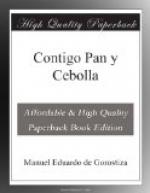ESCENA CUARTA
como quien dice: ‘as you might say.’
Hace que se va: ‘pretends to go.’
ESCENA QUINTA
el mismo que viste y calza: ‘fine and dandy’; ‘as big as life.’ The correct expression is vestido y calzado.
ESCENA SEPTIMA
A buena hora, mangas verdes: ‘nice time for that.’ Cf. the similar expression buenas son mangas despues de pascua ’it’s high time, but better late than never.’
ACTO CUARTO, ESCENA CUARTA
ha caido un rayo en Santa Barbara: Mesonero Romanos in “El antiguo Madrid” mentions the convent of Santa Barbara at the end of the Calle de Hortaleza, a well-known street in Madrid, but states that the building has been removed to make way for private residences.
y lo que cae: ‘and with what he can pick up.’
me parece usted pieza: ‘it strikes me you’re something of a wag.’
todas las colegialas de Loreto: ’all the girls who attend the convent of Our Lady of Loreto.’ The convent was so named in honor of the Virgin Mary, an image of whom, called Nuestra Senora de Loreto, had been brought from Rome and set up in the adjoining church of the same name. The school at first was for poor children; but later Philip IV established here a convent for orphan girls of good family.
ESCENA QUINTA
las Salesas: convent of the nuns of Our Lady of the Visitation. Mesonero Romanos ("El antiguo Madrid,” p. 253) writes of it: “El convento puede llamarse un verdadero palacio regio.”
ESCENA SEXTA
ello ninguna tenia: ello es que ninguna tenia; ’it is a fact that not one of them had.’
vamos alla: ‘no one else will.’
ESCENA SEPTIMA
Algarbe: Algarve, province in the extreme south of Portugal.
ESCENA OCTAVA
soy la Nicolasa: definite article frequently used with a woman’s name in a slightly depreciative sense or to express familiarity.
me ira muy bien: ‘will be very becoming to me.’
como dijo el otro: colloquial expression used after what the speaker considers a pat remark. Cf. English “as Shakespeare says.”
ESCENA DECIMA
casa donde no hay harina: the correct version of the proverb is donde no hay harina, todo es mohina (’ill humor’ or ’bickering’); “love flies out of the window when poverty enters the door.”




